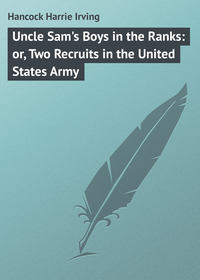 полная версия
полная версияDave Darrin and the German Submarines. Or, Making a Clean-up of the Hun Sea Monsters
“I’ll take the trouble, anyway,” Darrin retorted. “Mr. Dalzell, your shoulder and mine both together.”
As the two young officers squared themselves for the assault on the door a black cloud appeared briefly on von Bechtold’s face. But as Darrin turned, after the first assault, the deep frown was succeeded by a dark smile of mockery.
Bump! bump! At the third assault the lock of the door gave way so that Dave and Dan saved themselves from pitching into the room headfirst.
“Oh, whew!” gasped Danny Grin.
An odor as of peach-stone kernels assailed their nostrils. They thought little of this. It was a sight, rather than the odor, that instantly claimed their attention.
For on the berth, over the coverlid, and fully dressed in civilian attire of good material, lay a man past fifty, stout and with prominent abdomen. He was bald-headed, the fringe of hair at the sides being strongly tinged with gray.
At first glance one might have believed the stranger to be merely asleep, though he would have been a sound sleeper who could slumber on while the door was crashing in. Dave stepped close to the berth.
Dalzell followed, and after them came the submarine’s commander.
“You will go back to the cabin and remain there, Mr. von Bechtold,” Dave directed, without too plain discourtesy. “Corporal, detail one of your men to remain with the prisoner, and see that he doesn’t come back here unless I send for him. Also see to it that he doesn’t do anything else except wait.”
Scowling, von Bechtold withdrew, the marine following at his heels.
As Darrin stepped back into the cabin he saw the stranger lying as they left him.
“Dead!” uttered Dave, bending over the man and looking at him closely. “He lay down for a nap. Look, Dan, how peaceful his expression is. He never had an intimation that it was his last sleep, though this looks like suicide, not accidental death, for the peach-stone odor is that of prussic acid. He has killed himself with a swift poison. Why? Is it that he feared to fall into enemy hands and be quizzed?”
“A civilian, and occupying an officer’s cabin,” Dan murmured. “He must have been of some consequence, to be a passenger on a submarine. He wasn’t a man in the service, or he would have been in uniform.”
“We’ll know something about him, soon, I fancy,” Darrin went on. “Here is a wallet in his coat pocket, also a card case and an envelope well padded with something. Yes,” glancing inside the envelope, “papers. I think we’ll soon solve the secret of this civilian passenger who has met an unplanned death.”
“Here, you! Stop that, or I’ll shoot!” sounded, angrily, the voice of von Bechtold’s guard behind them.
But the German officer, regardless of threats, had dashed past the marine, and was now in the passageway.
“Here, I’ll soon settle you!” cried the marine, wrathfully. But he didn’t, for von Bechtold let a solid fist fly, and the marine, caught unawares, was knocked to the floor.
All in a jiffy von Bechtold reached his objective, the envelope. Snatching it, he made a wild leap back to the cabin, brushing the marine private aside like a feather.
“Grab him!” yelled Dave Darrin, plunging after the German. “Don’t let him do anything to that envelope!”
CHAPTER IV – THE TRAIL TO STRANGE NEWS
Fortune has a way of favoring the bold. The corporal and a marine were in the corridor behind Darrin. The ober-lieutenant’s special guard had been hurled aside.
Hearing the outcries, the other two marines in the cabin sprang toward the German officer. One of these von Bechtold tripped and sent sprawling; the other he struck in the chest, pushing him back.
Just an instant later von Bechtold went down on his back, all five of the marines doing their best to get at him in the same second. But the German had had time to knock the lid from a battery cell and to plunge the envelope into the liquid contained in the jar. Then the German was sent to the mat by his assailants.
Darrin, following, his whole thought on the envelope, plunged his right hand down into the fluid, gripping the package that had been snatched from him.
“Sulphuric acid!” he exclaimed, and made a quick dive for a lidded fire bucket that rested in a rack. The old-fashioned name for sulphuric acid is vitriol, and its powers in eating into human flesh are well known. Darrin’s left hand sent the lid of the bucket flying. Hand and envelope were thrust into the water with which, fortunately, the bucket was filled. When sulphuric acid in quantity is added to water heat is generated, but a small quantity of the acid may be washed from the flesh with water to good advantage if done instantly. After a brief washing of the hand Dave drew it out, patting it dry with a handkerchief. Thus the hand, though reddened, was saved from painful injury. The envelope he allowed to remain in the water for some moments.
“Von Bechtold, you are inclined to be a nuisance here,” Darrin said coolly. “I am going to direct these men to take you above.”
“I am helpless,” replied the German, sullenly, from the floor, where he now lay passive, two marines sitting on him ready to renew the struggle if he so desired.
“Take him above, you two men,” Darrin ordered, “and take especial pains to see that he doesn’t try to escape by jumping into the water.”
At this significant remark von Bechtold paled noticeably for a moment. Then his ruddy color came back. He got upon his feet with a resentful air but did not resist the marines who conducted him up to the deck.
Dave now drew out the envelope, which had become well soaked, and took out the enclosure, a single sheet. The writing at the top of the sheet was obliterated. Darrin did not read German fluently, but at the bottom of the sheet he found a few words and phrases that he was able to translate. Their meaning made him gasp.
“Danny-boy,” he murmured to his chum, “I want you to make quick work of transferring the prisoners to the ‘Logan.’ Keep back two of the German engineer crew, and send word to Ensign Phelps to come over on the launch’s next trip with two men of our engine-room force, and to bring along also six seamen and a petty officer. Phelps will take charge of this craft as prize officer.”
The submarine was soon cleared of her officers and crew. Ensign Phelps and his own men came over and took command. Two German engine-room men had been kept back to assist the Americans. On the last trip Darrin and Dalzell returned to the undersea boat and gave the order to Ensign Phelps to proceed on his way to the base port.
As soon as the prize with its captors was under way, Darrin went to the chart-room of the “Logan,” sent for the marine corporal, and ordered that Ober-Lieutenant von Bechtold be brought before him.
As the prisoner was ushered in Dave rose courteously, bowed and pointed to a chair.
“Be seated, if you please. Now, Herr Ober-Lieutenant, your second-in-command and your crew will be taken ashore as ordinary prisoners of war, and turned over to the British military prison authorities. Of course you are aware that your own imprisonment will take place under somewhat different circumstances.”
Von Bechtold, who had accepted the proffered chair, gazed stolidly at this American naval commander, who was several years younger than himself.
“I fear that I do not understand you,” the German replied.
“You soon will, for you speak excellent English,” Darrin returned, with a chilly smile. “Your English does not have exactly the Chicago accent, but it was good enough for your purposes. The Chicagoan speaks with a sort of sub-Bostonese accent, as perhaps you did not know. Your own English has rather the sound of Oxford or Cambridge University in England.”
Opening his eyes wide, and expressing bewilderment, the German begged:
“Will you be good enough to speak more explicitly?”
“Certainly,” Dave assented. “When you are turned over to the British military authorities it will be done with a card showing that you now give the name of von Bechtold – ”
“Which is my right name,” interposed the German officer, tartly.
“And the card will also state that, a few days ago, you gave the name of Matthews.”
“Again you use that name of Matthews,” cried von Bechtold, impatiently. “May I ask why?”
“I will make it so clear,” Dave promised him, “that you would understand even though what I am about to say were not true. But it is true. A few days ago you met me at the hotel in port. You met also my executive officer, Mr. Dalzell. You introduced yourself to us as Matthews, claimed to be a buyer for a Chicago dry-goods house, and declared that your mission was to buy linen.”
“Not a word of truth in it,” declared von Bechtold, calmly, with a wave of his hand, as though to brush aside the charge.
“Unfortunately, quite true,” Dave went on, steadily. “You were there under an assumed name and claimed to be an American citizen. You exhibited an American passport; I have heard that your government has a printing office where such documents are turned out. You were there out of uniform. In other words, sir, your conduct on British soil, in civilian dress and under false colors, met with all the requirements of proof that you were there as a spy. It has long been known to the British, and to us, that German spies have abounded in Great Britain and that they obtained a good deal of information that we would rather German submarine commanders did not possess. So, Mr. von-Bechtold-Matthews, it will be my disagreeable duty to hand you over with the charge that you have been serving as a spy. Dalzell and I will be obliged to testify against you. I much fear that a British court-martial will condemn you to be shot.”
“What infamous lie is this that you are threatening to utter against me?” demanded the German officer, leaping to his feet.
“No lie at all, as you know quite well,” Dave went on. “I am sorry to have to bring you to this plight, von Bechtold, but you know that I cannot do otherwise.”
Gazing into the steady eyes of the young American naval officer von Bechtold realized the folly of further acting. Breathing hard, he dropped into a chair.
“It is not a fine thing that you propose to do to me,” he declared. “You do not know, of course, that I have five young children at home, who will need a father.”
“I did not know it,” Dave answered gently. “Yet I feel quite certain that some of the information you have gathered, when ashore in these parts, has resulted in the drowning at sea of a good many men who may have left behind even more than five children.”
“I feel that I am doomed,” shuddered the German, throwing a hand up over his eyes. “My five little children will not see their father again – not even when this war is over.”
“It is too bad,” Dave answered, “but I suppose, Herr Ober-Lieutenant, that it must be classed with the fortune of war. Now, as to the identity of the civilian who lies dead in a berth aboard your late command, it may be that, if you were ready to tell something about the reasons for his presence on board, and why he had in his possession this paper – ”
Here Darrin spread out the wet sheet of paper that he had brought from the submarine.
“I can tell you nothing about either the civilian or that paper,” declared von Bechtold, doggedly.
“That is your own affair,” Darrin admitted. “I shall not make any attempt to force you.”
“You had better not!” declared the German, fiercely. “I can die, but I cannot betray my country. Yet have you no heart? – when I tell you about my five little children whom you would deny the privilege of ever seeing their father again?”
“If I were to suppress my report of your activities as a spy,” Darrin continued, “I would be guilty of betraying my country and my country’s allies. It would also be necessary for me to induce my subordinate officer to do the same thing. You will realize the impossibility of our doing such a thing. On the other hand, between now and the time that you are tried by court-martial you will have time to reflect upon whether you wish to try to save yourself from the death sentence by explaining to the British authorities the full meaning of what had been written on this sheet of paper and also the reasons for that civilian being aboard your craft. Then, by throwing yourself on the mercy of the court, you might escape the full penalty meted out to a spy.”
“I shall not do it,” declared von Bechtold, rising and drawing himself to his full height.
“Nor do I believe I could be induced to tell what I knew if I stood in your boots. Orderly!”
To the marine who entered Dave gave the order to summon the guard. Von Bechtold was taken back to the “Logan’s” brig, and locked in for absolutely safe keeping. Darrin went up to the bridge.
“Do you feel sorry for the fellow?” asked Dalzell, when he had heard an account of the interview.
“No more sorry than I do for any man who is down and out,” Dave replied, truthfully. “Now that he is captured and his spy work ended, I believe that ships on these waters will be much safer.”
“He will be just one Hun less, after a firing squad has finished with him,” Dan rejoined.
Dave nodded thoughtfully.
“War breeds savage ideas, doesn’t it?” demanded Danny Grin, with a shrug of his shoulders.
“Not breeds, but brings out,” answered Darrin.
They were nearing the coast now. Destroyers, patrol boats, drifters and mine-sweeping craft sighted the “Logan” and her prize, and the shrill whistles of these hunters of the sea testified to their joy over the capture.
Then the destroyer and her prize entered the port. Darrin brought his craft to anchorage, while the captured submarine was anchored not far away. The German prisoners were taken ashore under guard and turned over to the British authorities.
Ober-Lieutenant von Bechtold, under the charge of being a spy, was marched away under a special guard.
And then Dave made haste to present himself, with the half-destroyed sheet of paper in his pocket, before the flag lieutenant of Vice Admiral Speare.
CHAPTER V – DAVE TALKS OUT IN COUNCIL
There was much joy aboard a squadron of six more destroyers, just arrived from Uncle Sam’s country, when, on steaming into port, they heard the news of the capture.
So far as Dave was concerned the document that he had discovered, mutilated as it was, had supplied hints that filled the British Admiralty and the American naval commander with deep apprehension.
Both Darrin and Dalzell were present in the crowded council room on board the vice admiral’s flagship. There were other American naval officers, as well as a few American Army staff officers present. Their faces displayed anxiety.
“It is too bad,” one of the American army staff officers declared, after scanning the damaged sheet under a magnifying glass, “that so much of this is obliterated. Of course, Mr. Darrin, we know that you acted promptly and that you did all in your power, and at considerable risk, to preserve this document. From the disconnected sentences that we can decipher, it would seem that at least sixty of the enemy’s submarines are to concentrate in near-by waters. It is also plain that their mission is to destroy the convoy escort and sink the troopships that are nearing these waters – troopships that convey the entire One Hundred and Seventeenth Division of the United States Army.”
“It would be a frightful disaster, if it came to pass,” boomed the deep tones of a British naval officer.
“It shall not come to pass!” declared an American naval officer.
“Easily said, and I hope as easily done,” replied the British officer. “But you Americans have not yet begun to lose ships loaded with troops. We Britishers have had some sad experiences in that line. Never as yet, though, have we had to face a concentration of sixty enemy submarines!”
“The way it looks to me,” said another American army staff officer, gravely, “is that, while the destroyer escort will surely sink some of the enemy submarines, yet just as surely, with the enemy in such force, will some of our troopships go to the bottom. It is mainly, as I view it, a question of how many troopships we are likely to lose, and how big a loss of soldier life we shall suffer.”
“Sixty submarines!” uttered a British naval officer, savagely. “We haven’t an officer on a destroyer who wouldn’t gladly go to the bottom if he could first have the pleasure of sinking a few of these deep-sea pests!”
“A distressing feature is that we cannot decipher the very part of this document which states where the submarine concentration is expected to strike,” declared a naval staff officer.
“How many British destroyers will be needed to reinforce the available American destroyers?” asked a British officer, apprehensively. “For we have so many uses for our destroyers, on other work, that it is difficult to guess where we are to find destroyers enough to help you Americans.”
This was known, by all present, to be only too true. The British Navy, from super-dreadnoughts to the smallest steam trawlers, was painfully overloaded with work.
“As Mr. Darrin is a destroyer commander with an uncommonly good record to his credit,” said an American naval staff officer, “and as we have not yet heard his opinion, I think we would all like to have his views.”
Dave Darrin glanced at the American naval commander, who sent him an encouraging nod.
“We know, then, gentlemen,” began Dave, “just how many American destroyers are to act as escort to the troopship fleet that is bringing the One Hundred and Seventeenth Division across. We know, also, just how many destroyers under our flag can be taken from patrol duty to safeguard the troopship fleet. We know the length of the sailing line of the troopship fleet; we know the speed of our destroyers. It seems to me that the answer is to be found in these known facts.”
“What is your suggestion as to the plan, then?” asked an officer.
“Gentlemen, in the presence of so many officers of wider experience and greater knowledge, I feel embarrassed to find myself speaking.”
“Go on!” cried several.
Darrin still hesitated.
“First of all, Mr. Darrin, in offering your suggestion, tell us what number of British destroyers you believe that you will need to reinforce the American destroyers that are available for protecting your troopship fleet,” urged one.
Dave still hesitated, though not from shyness. He did some rapid calculating as to the length of the line of troopships sailing in the regular order. Then he figured out how many destroyers could give efficient protection against sixty German submarines.
There was tense silence in the council room. At last Darrin looked up.
“Well,” demanded the insistent British naval staff officer, “how many of our British destroyers do you think, Darrin, are needed to help out your American destroyers?”
Dave turned his face toward the American vice admiral.
“Sir, and gentlemen,” he replied, “if we had three times as many destroyers we could use them. I have an opinion on the subject, but it will sound so childish to you that I should prefer to sit back and let older heads offer suggestions.”
“Darrin,” spoke the flag lieutenant, after a nudge and a whispered word from the vice admiral, “this is no question of age, nor is it wholly a question of experience. Demonstrated ability, ability backed by a record, is entitled to a hearing here. You have done your figuring, and you have reached certain conclusions. How many British destroyers do you believe we shall need to help out the American destroyer fleet that is now available?”
This amounted almost to an order to speak up. Dave reddened perceptibly, opened his mouth as though to speak, closed it again, then cleared his throat and called out steadily:
“Sir, and gentlemen, it is my opinion that the American naval forces available for the work can do all the work! I do not believe that we need an ounce of British help that would be so graciously extended if we asked for it!”
There was a moment’s silence.
“No help needed from us?” demanded the British naval staff officer.
“It would be welcome, sir,” Dave declared, “but you cannot spare the help. Whatever assistance you gave us at this time would weaken your lines of defense or offense at some other point. They are American soldiers who are to be protected, and – ”
Here Darrin’s voice failed him for a moment. He felt as though the more than score of pairs of eyes that were regarding him sharply were burning him. He swallowed hard, but returned to the charge and went on, slowly, in words that rapped like machine-gun fire:
“I would stake my soul that the American Navy can safeguard the passage of the One Hundred and Seventeenth Division of the American Army!”
There was a gasp. The words were bold, but, if true, they solved a vexing problem. The spirit of the United States Navy had spoken through Dave Darrin’s lips.
“Darrin,” shouted an American staff officer, bringing a fist down on the table, then springing to his feet, “you’ve answered for us! You’ve given us our chart. I’d trust the best troopship fleet we’ll ever send over the ocean to the guarding care of a dozen young Yankee naval commanders of your stripe.”
In an instant the enthusiasm became infectious. A cheer arose, in which the vice admiral joined. The British naval officer of the booming tones left his seat and went over to grasp Dave’s hand.
“Darrin, I wish we had you in our Navy!” he said, simply.
There was little more left to be agreed upon. It was decided, however, that a combined fleet of British and American patrol boats should be in readiness to swoop down and save lives in case any of the American troopships should be torpedoed.
The council soon broke up. All that was now left to be done was for the vice admiral and his immediate staff to formulate the exact plans for the protection of the One Hundred and Seventeenth Division. Even after the destroyer fleet had turned itself loose on its task, further instructions could be sent in wireless code.
“Gentlemen,” said the vice admiral, rising, “I thank you for your attendance, for your consideration of the problem, and for whatever help you have been able to extend. And I can see no objection,” he added, a twinkle in his eyes, “to your giving three cheers for Lieutenant-Commander Darrin.”
Proud? Not a bit. As the volleys of cheers rang out deafeningly, Dave Darrin felt as though he would enjoy sinking through the deck.
But Danny Grin was there, and he undertook the job of feeling proud for his chum.
CHAPTER VI – THE GLOW-WORM OF THE SEA
Out upon the tossing sea once more. It was a wonder that the “Logan” did not sit much deeper in the water, for she carried a most unusual load of ammunition of every useful kind.
Out upon the sea, and seemingly alone at that. Not a sail was visible to the officers on the taut little destroyer, not a trail of smoke appeared on any part of the horizon. Indeed, the present speed and low fuel consumption aboard the “Logan” allowed only the thinnest wisps of smoke to issue from the raking funnels of the destroyer.
Had Dave needed other destroyer company, for any urgent reason, a signal snapping from his radio aerials would bring one, perhaps two, American destroyers to him within an hour. For some of these bulldog little fighting craft, that were out after the deep-sea pests, were capable of making more than thirty knots an hour.
The “Logan” had been out four days. Though headed westward at this moment, she had not been moving steadily westward, for she was now not more than three hundred and thirty miles west of the coast of Ireland.
On this fourth day, as on its predecessors, the destroyer steamed along at cruising speed. Though the crew knew nothing of Germany’s proposed big submarine drive directed at the troopships conveying the One Hundred and Seventeenth Division, yet every marine and sailor felt that something unusual was in the wind. The lookouts had been instructed to aid their vision by the free use of their marine glasses and precautions out of the ordinary had been taken in other directions.
“The Germans are using a new submarine periscope, slimmer than any that they have heretofore employed. They hoist it for only a few seconds at a time and do not send it as far out of the water as they did with the old style periscope. The man who sights a periscope in time will save our ship.”









